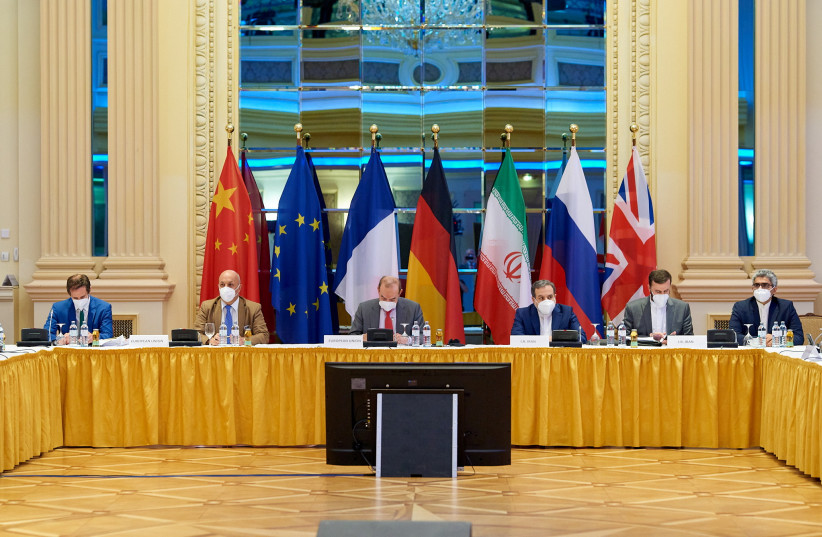A return to a nuclear deal with Iran is unlikely to take place before the US holds its midterm elections in November, a European diplomatic source said on Wednesday, as the International Atomic Energy Agency reported further advances in the Islamic Republic’s nuclear program.
Iran’s latest response to what was meant to be a final draft of the agreement has almost eliminated the chance of a deal being reached in the coming days. After that, it will be too late for a speedy conclusion to talks, the source explained.
US law requires a 30-day congressional review period before any deal lifting sanctions on Iran can be implemented, which would put a potentially unpopular agreement on the agenda in mid-October, shortly before the November 8 elections. The European source, as well as Israeli officials said that US President Joe Biden would likely choose to avoid that scenario.
The US left the Iran deal in 2018, with then-president Donald Trump saying it was reached under false pretenses and did not sufficiently limit Iran’s nuclear program. Biden vowed to rejoin it during his campaign for the presidency. Iran began major violations of the nuclear program, which limited its uranium enrichment to 3.67% purity as opposed to its current 60%, in addition to violating restrictions on stockpiling, developing advanced centrifuges and more. The Biden administration has been in indirect talks with Iran to return to the agreement since April 2021.
Further delays in negotiations, coupled with ongoing advances in Iran’s nuclear program, could jeopardize the deal if it is set aside for two more months.

Prime Minister Yair Lapid may have hinted at the delay in his remarks on Tuesday, in which he said it is still “too early to know if we indeed succeeded in blocking the Iran deal.”
The delay comes as the International Atomic Energy Agency reported that Iran has stockpiled enough uranium enriched to 60% purity to build a bomb if it is enriched to weapons-grade, which is 90%.
Iran’s uranium enriched to up to 60% and in the form of uranium hexafluoride, the gas that centrifuges enrich, is estimated to have grown by 12.5 kg. to 55.6 kg. since the last quarterly International Atomic Energy Agency report issued on May 30, the IAEA report to member states seen by Reuters said.
What are Iran's demands?
Among Iran’s demands is that the IAEA close its investigation into traces of enriched uranium found at three undeclared nuclear sites. The US and E3 – Britain, France and Germany – oppose doing so before Iran provides the agency with credible answers.
The IAEA issued a second report on Wednesday saying Iran had still not provided credible answers on the origin of the uranium particles.
“The Director-General is increasingly concerned that Iran has not engaged with the Agency on the outstanding safeguards issues during this reporting period and, therefore, that there has been no progress towards resolving them,” the second report, also seen by Reuters, said.
A further delay in the talks would make the IAEA Board of Governors less likely to try to accommodate Iran to push through a deal, the European source said.
Iran also demanded stronger guarantees from the US that lifting sanctions would be effective and that it would not leave the deal in the future, which Biden cannot legally give.
Earlier this week, Iran talks’ coordinator EU High Commissioner for Foreign Affairs Josep Borrell said he was “less confident... about the conversion of the negotiation process and the prospect of closing a deal right now.”
Tehran’s demands for additional guarantees are “very much worrisome,” Borrell said.
“If the process doesn’t converge, then the whole process is in danger. The last answer we got – if the purpose is to close the deal quickly – it’s not going to help,” the EU commissioner said.
Biden congratulated new UK Prime Minister Liz Truss on Tuesday night. Among the topics they discussed was “preventing Iran from ever acquiring a nuclear weapon,” the White House stated.
Lapid referred to conventional threats from Iran during an Israel Navy graduation ceremony.
“There is a greater and greater presence of Iran in the Red Sea,” the prime minister warned. “We will not accept this presence. We will not allow Iran and its proxies to become a central player in our naval arena. They will try to push us to the edge, but you will be there, and you know you are better than they are.”
Reuters contributed to this report.
